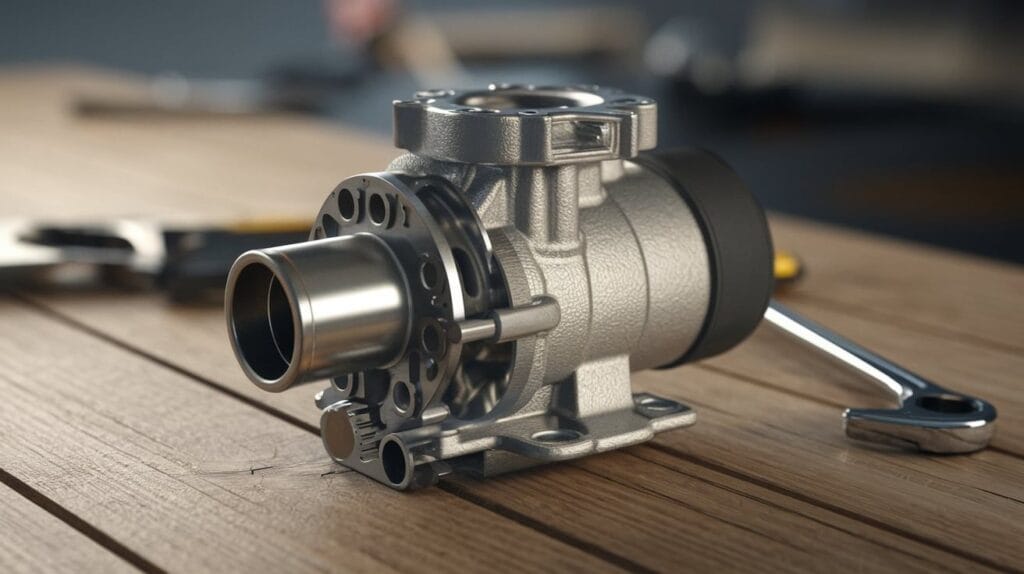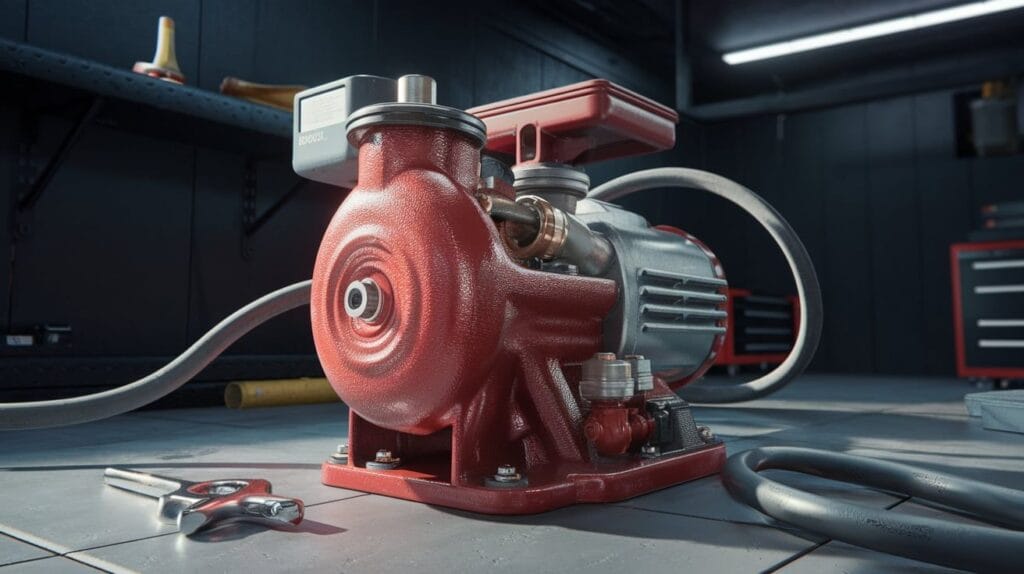
If your car makes rattling, squeaking, and other different sounds, then some part of it is failing and not working, resulting in different sounds.
Power steering is an important part of the vehicle, helping drivers easily maneuver the car. However, if the power steering pump starts making noise, it often signals underlying issues affecting the steering performance and, ultimately vehicle safety.
If the sound is coming from under the hood then it’s a power steering pump noise. You don’t need a professional to find that it’s a power steering pump noise.
In this guide I will walk you through how to fix the power steering wheel noise and the causes of the noise if you follow the detailed guide you’ll be able to fix the noisy power steering pump without taking your vehicle to a mechanic.
What Is The Power Steering Pump Noise?
Power steering pump noise is an unusual sound, often described as whining, grinding, or groaning produced by a power steering system. It typically becomes louder while taking sharp turns or turning the wheel completely on one side. Power steering noise can vary in intensity and pitch depending on the cause. Ignoring the power steering pump noise will cause further damage.
Common Types Of Power Steering Pump Noise
There are different types of noise below are a few of the common types of noise that are often generated.
Whining Noise
A high-pitched whining or squealing sound occurs due to air trapped in the power steering fluid, low fluid levels, or a malfunctioning pump. This noise is common and indicates a problem with the power steering pump.
Grinding Noise
Grinding noise is generated if there’s metal-on-metal contact within the pump due to worn bearings, debris, dust, or contamination in the fluid. Grinding noise is often caused by worn-out bearings.
Groaning Noise
Groaning noise is typically produced by fluid foaming, leading to reduced lubrication and increased friction. This is often due to low fluid levels, and improper fluid type or air bubbles formed in the system.
How Much Does It Cost To Replace A Power Steering Pump?
On average, replacing a power steering pump can cost between $500- $900 Also it’s important to avoid serious damage to the power steering system. Replacing the pump by yourself can save up to$300 and overall the cost of repair. A few factors will impact the final price of replacing a power steering pump:
If your vehicle is large and luxurious then this often needs more expensive parts than other vehicles.
You can save hundreds of dollars by replacing the power steering pump by yourself if you have worked on the car.
Replacing a new power steering pump can cost around $400 to $500. Replacing with a used pump is less expensive but the used pump may lack longevity compared to newer one.
OEM power steering pump comes from car manufacturers that are more expensive than the power steering pump made by an aftermarket company.
What Causes Power Steering Pump Noise?
Understanding the reason behind the power steering pump noise will help in knowing the exact problem eliminating the noise and helping in better fixing.
1. Low Fluid Level Of Power Steering
Power steering fluid is essential for the smooth functioning of the power steering system. Low fluid levels will cause the pump to overheat, which generates the whining noise. If the fluid level drops it will allow the air in the system resulting in additional noise generation and reducing the efficiency of steering.
Check the power steering reservoir and refill as needed. Ensure to use the recommended fluid type for your vehicle. If the fluid level continues to drop inspect for leaks around the pump, hoses, or steering gear.
2. Air In Power Steering System
If the fluid levels drop air can enter the power steering system or if there’s a leak it will pass the air into the steering system. Air bubbles create a whining or squealing noise and reduce the hydraulic effectiveness of the fluid.
To remove the air from the system. Turn the steering wheel fully left and right several times with the engine off. This process is called bleeding which forces air out of the system. After completion of the process recheck the fluid level and top it off if necessary.
3. Incorrect Fluid
Power steering system requires specific fluid types with unique additives that provide proper viscosity and protect against wear. Using the wrong fluid can damage the components while dirt or contaminated fluid reduces the lubrication resulting in making the pump performance harder and leading to noise.
If the fluid is contaminated or dark then flush the power steering system and refill it with the manufacturer’s recommended fluid. Power steering fluid should be checked regularly and replaced as recommended in your vehicle’s service manual for better performance and to reduce the power steering pump noise.
4. Worn Out Pump Bearings
The main function of bearings inside the power steering pump is to keep the components rotating smoothly without friction. Over time these bearings can be worn out due to friction resulting in grinding or whining noises.
Worn-out bearings generally require the replacement of the power steering pump as these bearings are not typically serviceable. Seek the help of a professional mechanic and inspect and repair as replacing the pump often requires complex disassembly.
5. Loose Or Damaged Drive Belt
The power steering pump is driven by a belt that is connected to the engine. If this belt is loose, cracked, or worn out it can cause slipping leading to whining noise.
Inspect the drive belt for wear and alignment. A worn belt should be replaced while a loose belt can be adjusted or tightened. If the belt appears to be slipping frequently, the tensioner pulley may also require replacement.
6. Leakage In Power Steering Pump Or Hoses
Leaks in the power steering pump or hoses will make the fluid escape resulting in the pump running with insufficient fluid leading to a whining or groaning noise.
Check the pump, and hoses for signs of leakage. Replacement of worn-out hoses or seals will help in eliminating the leakage as they are the ones causing the leakage.
Seek Professional help if the internal pump components are causing the problem. After the replacement the leaks will be sealed and the pump will be smoothly operating.
7. Clogged Filters
Some power steering systems consist of filters to prevent debris from circulating through the system. A clogged filter will refrain the fluid flowing resulting in increased pump strain and noise.
If your vehicle has a power steering filter check the condition if requires replacement. For vehicles without filters consider having the fluid and inspect the pump regularly to avoid debris and contamination.
How To Fix Power Steering Pump Noise?

There are a few things you can do to fix the power steering pump noise. It depends on the cause of the problem.
1. Due to low fluid level the steering system may be generating whining noise. Check the steering fluid level. To check remove the cap on the reservoir and if the level is low top it too. Ensure to use the high-quality steering fluid or the recommended one by your vehicle manufacturer for smooth performance and long lasting.
2. While checking the quality of the fluids inside the reservoir if you find residue or contaminated fluid then probably it has lost its consistency it’s time to change the fluid as the air bubbles are formed which indicates time to change the fluid in your steering system.
3. Inspect for leaks. Cracks will lead to leakage as you need to inspect thoroughly. The usual culprits are fluid hoses as it is made of rubber and mostly get damaged. If the hole is tiny you need to seal it with a stop leak. If it’s a bigger hole you need a hose replacement.
4. If the hose is clogged you need to attempt unclogging it yourself. But if you have never performed this before it’s better to seek professional help. To do it yourself. Place a drain pan below the hose as some oil will drain out from it. Replace the old hose with a new one following the instructions in your user manual as they differ for vehicle models.
5. Check with the power steering drive belt over time it will be loosened or worn out. Check for the cracks and if the belt is loose then tighten it but for the worn-out belt, you need to replace it with a new one.
Do not apply pressure to take off the old belt you may end up damaging the pulley. Gradually move the adjuster and pivot bolts and push the pump inwards with the help of the cast front plate until the belt is easy to remove.
Do not push against any other part of the pump as you may end up damaging it.
It’s time to remove the old belt and replace it with a new belt to fit the new belt and ensure it is properly fitted. Pull the pump outwards and adjust the tension.
Congratulations you have replaced the power steering drive belt.
Tips To Maintain Power Steering Pump
Once you get rid of the power steering pump noise you need to keep it in good condition by taking all the necessary precautions so that the issue doesn’t occur again. To keep your steering pump maintained you need:
Check The Fluid Level Frequently: Open the cap of the reservoir and see how much oil is there inside.
Inspect For Leaks: Regularly inspect for leaks in the pump and hoses. A low fluid level can damage the entire power steering system.
Replace Worn-Out Components: Drive belts, hoses, and filters should be replaced as needed to prevent the strain on the pump.
Take The Vehicle For Regular Checks: The mechanic will identify if there is any underlying issue and help you avoid costly repairs.
Conclusion
If your car makes an unusual sound it’s a sign that something is wrong with it unless you pinpoint the issue it will get louder as the days pass and costly to repair later on.
Power steering pump noise is often a sign of an underlying issue, You can fix the issue by yourself. Check the fluid level and if it’s less top it up, Inspect the leaks, clogged hoses and worn-out bearings, and pump steering drive belt.
The above guide will help you to identify the cause and fix the power steering pump noise. Also if you’re making any other noise from the car make sure to check my guide on squeaking windshield wipers, or air vent whistling.
